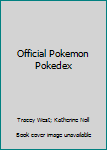Official Pokemon Pokedex
Ed Ruscha was born in Nebraska and raised in Oklahoma, but he belongs to Los Angelesin a way that few other artists do. Since the 1960s, Ruscha's iconic images of the cityscape andculture of Los Angeles--freeway gas stations, parking lots, palm trees, motels, swimming pools, andbillboards--have both reflected and shaped popular perceptions of Hollywood and the city thatsurrounds it. In Ed Ruscha's Los Angeles, Alexandra Schwartz views Ruscha's groundbreaking earlywork as a window onto the radically shifting cultural and political landscape in which it wasproduced. Schwartz examines Ruscha's diverse body of work, including paintings, drawings, prints,photographs, books, and films, and discusses his relationship with other artists--including JohnAltoon, Ed Kienholz, Billy Al Bengston, and Dennis Hopper, all of them associated with the famousFerus Gallery--with whom he sparked the movement known as West Coast pop. She also explores hislinks to the mainstream film industry, then evolving into the experimental New Hollywood of the late1960s and early 1970s; his association with emerging discourse on L.A. architecture and urbanism;and his participation in the politics of the L.A. art world, where his presentation andself-marketing reflected contemporary attitudes toward gender, race, and class. Despite Ruscha'sfame, this is the first comprehensive critical consideration of his art, and the first to considerit in the context of L.A.'s tumultuous 1960s and 1970s. It shows how Ruscha, borrowing from andcritiquing the methods and myths of Hollywood, forged a new paradigm of the artist as a popularculture scribe--a soothsayer for the entertainment age.
Format:Hardcover
Language:English
ISBN:0439855861
ISBN13:9780439855860
Release Date:January 2006
Publisher:Not Avail
Length:111 Pages
Weight:0.50 lbs.
Age Range:8 to 12 years
Grade Range:Grades 3 to 7
Customer Reviews
0 rating





